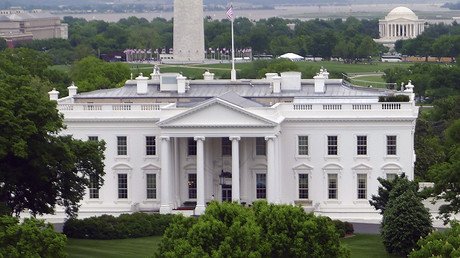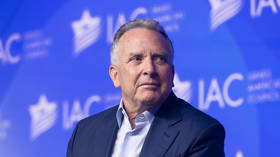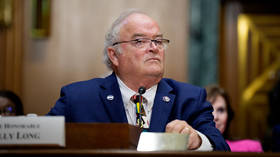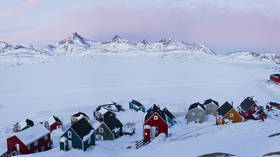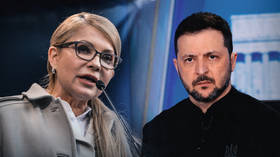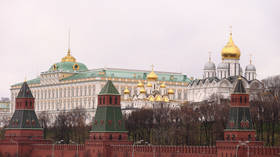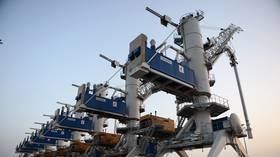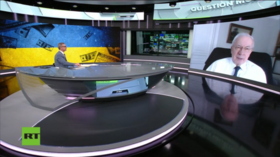Dozens of Russian defense companies included in list of potential new US sanction targets
The US is edging towards the eventual implementation of a new round of sanctions against Russia after the State Department provided Congress with a list of Russian defense and intelligence entities, missing the deadline by almost a month.
“Secretary of State Rex Tillerson has authorized the department to issue guidance to the public specifying the persons or entities that are part of or operating on behalf of the defense or intelligence sectors of the government of the Russian Federation,” State Department spokesperson Heather Nauert said. “What that means is that Secretary Tillerson has signed off on this and it is now being held on Capitol Hill.”
The State Department is “currently informing Congress, key US industries stakeholders and our allies and partners” of the directive, she added.
.@statedeptspox provides an update on the Countering Russian Influence in Europe and Eurasia Act of 2017. #Russiapic.twitter.com/IwlyoB0QC4
— Department of State (@StateDept) October 26, 2017
The list includes over thirty Russian defense sector entities, starting with the state-owned Russian Technologies State Corporation, Rostec. The titan of Russia’s civil and military production, Rostec incorporates roughly 700 entities which form 14 holding companies which manufacture anything from AvtoVAZ cars to Kamaz trucks.
Germany's Steinmeier: Relations with Russia too important, countries must find bond
Rostec also controls Rosoboronexport, the sole Russian state intermediary agency responsible for the import and export of defense arms which is also on the list. Some of the other companies working with Rostec, such as the world-famous AK-47 producer Kalashnikov Concern JSC, is a potential target as well.
US sanctions bill vs Russia built on fraudster's political lobbying – Russian lawyer Veselnitskaya
One of the oldest and largest shipyards in Russia, Admiralty Shipyard, is also a possible target. The company, located in St. Petersburg, primarily deals with submarines design, development, and construction.Dolgoprudny Research Production JSC which manufactures products such as anti-aircraft missiles, launchers and rockets has also been added to the list.
Mytishchinski Mashinostroitelny Zavod which handles naval, aircraft, anti aircraft, tank, coast and field artillery products also shared the same fate.
Russian aviation industry leaders Sukhoi Aviation, Tupolev JSC and United Aircraft Corporation were also singled out by the State Department.
New targets of US sanctions also include six entities working in the Russian intelligence sphere. The Federal Security Service (FSB), Foreign Intelligence Service (SVR), the Main Intelligence Directorate of the General Staff of the Russian Armed Forces (GRU) are the agencies that stand out from the list.
The State Department's move forms part of the implementation of the ‘Countering Russian Influence in Europe and Eurasia Act of 2017.’ The legislation was passed by the Senate on July 27 and ushered in new sanctions against Russia, Iran, and North Korea.
In early August, President Donald Trump signed the act into a law, promising to provide a list of individuals and organizations that should be added to the sanctions list by October 1.
The State Department, however, failed to compile their list on time, pushing back the deadline by almost a month.
READ MORE: Trump signs Russia sanctions bill despite ‘clearly unconstitutional’ provisions
“It took a little bit of time,” Nauert told reporters. “The secretary himself said that these are complex matters and we want to get it right.”
The holdup was explained earlier Wednesday by the White House as a result of an “interagency review.”
One of the authors of the massive sanctions bill, Sen. Bob Corker (R-TN), has welcomed the State Department's recommendations.
“The guidance provided today by the State Department is a good first step in responsibly implementing a very complex piece of legislation, and I appreciate Secretary Tillerson’s attention to this important issue,” Corker said in a statement obtained by The Daily Beast.
“Congress will expect thorough and timely consultation until full implementation is complete,” the senator added.
Trump was very reluctant to sign the ‘Countering American Adversaries Through Sanctions Act’ in August, saying it is “seriously flawed” and had “clearly unconstitutional provisions” that limited presidential powers.
The US President's signing of the package of new Russia sanctions ends hopes for improving our relations https://t.co/UizYaTbSR6
— Dmitry Medvedev (@MedvedevRussiaE) August 2, 2017
“By limiting the Executive’s flexibility, this bill makes it harder for the United States to strike good deals for the American people, and will drive China, Russia, North Korea much closer together,” Trump stated at the time.
Most of the companies on the newly compiled list are already under US sanctions, Russia's Trade and Industry Minister Denis Manturov said, adding, that it did not come as “big news for us.” The minister said Russian companies have over the years managed to adapt to the economic restrictions first introduced by the Barack Obama administration and then by Trump’s. Manturov voiced hope, though, that this time, the US approach will be “more reasonable.”
“This should not affect the business,” the minister said. “If it is so important for the US administration to implement sanctions against specific companies, we cannot prohibit it... but at the same time, we expect this to be a reasonable approach.”
By focusing their sanctions on Russia's military industry, Washington may be trying to fight off competition on the global arms trade market, believes Richard Becker from the anti-war ANSWER Coalition.
“At the top, they are supportive of an objective of US global domination. And they have been for many, many decades now... And they see Russia as an obstacle to this,” Becker said.
“The US military is by far the most powerful in the world and the US military industries are most numerous and the largest, but they are targeting the Russian infrastructure, particularly military and defense infrastructure as part of this anti-Russia campaign,” he added.
